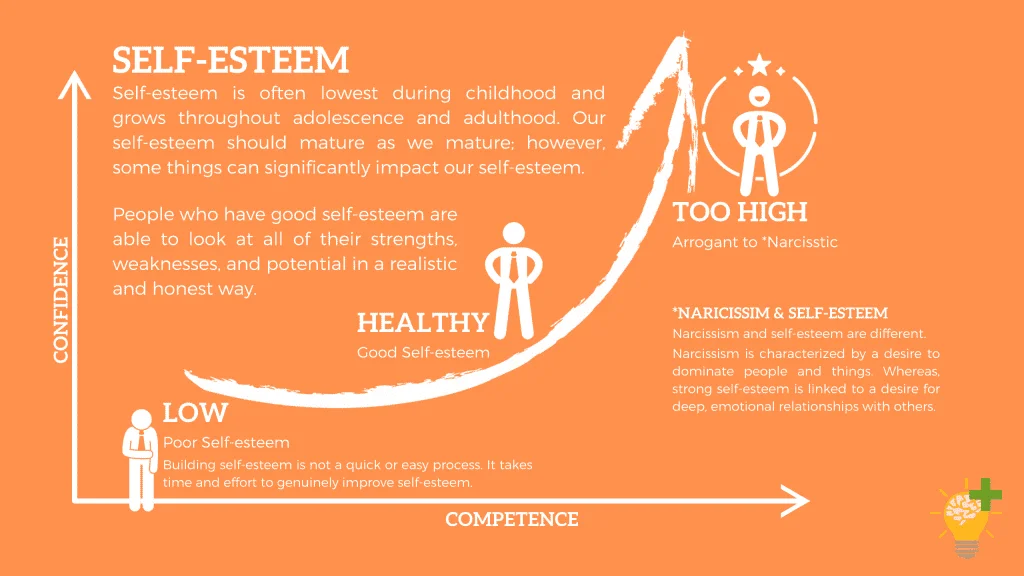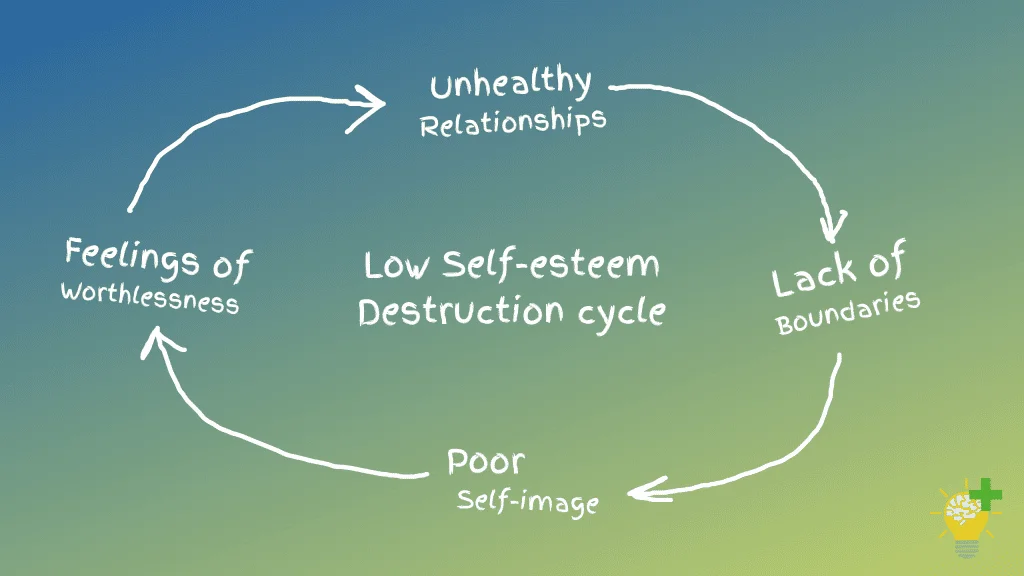ink that self-esteem can ebb and flow. I know that I have experienced periods of low self-esteem throughout my life.
I think it’s healthy to take a personal inventory and evaluate how our self-esteem is doing. Have you experienced both healthy self-esteem and low self-esteem?
If you have, you’re not alone. If you aren’t sure, I think this article will be enlightening as we look at a few low self-esteem examples.
What is Self-Esteem?
Self-esteem is a psychological phrase that refers to a person’s overall sense of personal worth or value. In other words, self-esteem can be described as the degree to which you value and like yourself regardless of the situation.
Several things contribute to developing your self-esteem, including self-confidence, your sense of security, your identity, your sense of belonging, and how competent you feel, to name a few.
Self-esteem is often lowest during childhood and grows throughout adolescence and adulthood. Our self-esteem should mature as we mature; however, some things can significantly impact our self-esteem.

Examples of Low Self-Esteem and What To Do About It
Low self-esteem can affect a person’s thoughts, emotions, and behavior. Occasionally, these indicators will be obvious, but sometimes they’re far more subtle.
Here are 15 examples of low self-esteem:
1- Avoid Confrontation
Avoiding confrontation is not inherently a bad thing. In fact, I encourage people to anticipate a confrontation to find solutions before a confrontation arises.
When someone has low self-esteem, avoiding conflict isn’t their first instinct. They may avoid conflict because they don’t want to risk being rejected.
They will avoid “rocking the boat” because they feel safe not being noticed.
2- People-pleaser
Trying to please others all the time is an impossible task. There are too many variables.
There is a big difference between being kind and genuine and being a people-pleaser.
People with low self-esteem try to please everyone else to gain approval. This is especially true when it comes to relationships.
3- Struggle to Build Healthy Relationships
When a person’s self-esteem is low, they often struggle with relationships, but not for lack of trying.
Their struggle lies in the desire for acceptance and a willingness to compromise their values to receive any attention at all.
Their attempts to “become someone they are not” to gain acceptance and affection often leave them feeling bad about themselves, leading to lower self-esteem. Relationships are about deep open communication, mutual respect, and honesty based on each person’s individual true character and needs.
4- Lack Boundaries
Boundaries are one of the essential tools to have healthy relationships.
People who have low self-esteem can have trouble setting healthy boundaries with others. They may feel guilty or afraid that people will stop liking or respecting them if they try to set boundaries.
Learning to set boundaries is often established early on in life. Children who are shown respect and value in their youth are more likely to create healthy boundaries in adult relationships.
5- Poor Self-image
When a person has low self-esteem, they frequently suffer from poor confidence.
When our confidence wanes, it can lead to negative self-perceptions.
Poor self-image is when you feel that people won’t like or accept you for yourself. This is a prevalent example of low self-esteem.
6- Feel Unworthy
Feeling unworthy is another symptom of low self-esteem that is often overlooked.
A person with low self-esteem feels that they don’t deserve anything good.
This is a form of emotional abuse. When we feel worthless, we believe that no one will ever love us or care about us.
If these feelings of inadequacy continue, they can spiral into a dangerous pattern of destruction.

7- Expect The Worst
Another example of low self-esteem is always expecting negative outcomes.
We will experience both positive and negative outcomes in our lives, and it’s okay to feel disappointed when we don’t get the results we want. What’s harmful and an indicator of negative self-esteem is always expecting the worst.
8- Lack of Control
Those who have low self-esteem often think that they don’t have much control over their lives or how things turn out for them.
I know that I can’t control everything, and I’m sure you know that as well.
However, there are things that we can control.
If we believe that we can’t make much of a difference in our own lives or the world, it leads to low self-esteem because we think we can’t do anything to overcome challenges.
9- Problems Asking for What You Need
If a person has low self-esteem, they may struggle to express what they need or feel they don’t deserve anyone’s help.
A person with low self-esteem might interpret their need as incompetence. They can develop unwarranted embarrassment when they need help and support.
They don’t prioritize their own needs, so they struggle to assert themselves if they’re in need.
A person with poor self-esteem can have a challenge asking for help. They also have difficulty making their own choices, which can further compound the problem.
10- Difficult Accepting Positive Feedback
People with low self-esteem are suspicious of compliments because they believe that the other person is trying to make fun of them.
I can understand why someone would have difficulty receiving negative feedback, but it’s hard to know when someone can’t accept even a simple compliment.
I remember a girl telling me in high school she liked my shirt, and at that moment, I was sure that there was something wrong with my shirt. It was a strange sensation then, and I still can’t explain why I felt that way.
I do know that low self-esteem makes it difficult to accept compliments.
11- Fear of Failure
People who feel inadequate often act out because they don’t believe they’ll succeed.
Low self-esteem leads to poor performance.
When someone feels bad about themselves, they can be afraid of failing.
It’s important to understand that failure isn’t the end of the world. We all fail sometimes, but we shouldn’t let fear of failure stop us from taking risks and pursuing.
12- Always Comparing Yourself to Others
Social comparison can occasionally be beneficial to self-esteem. But making comparisons to others can also harm self-esteem.
With low self-esteem comes an increased tendency for what is known as upward social comparison, or comparing yourself to others that you believe are better than you.
Social comparison can be beneficial. These comparisons can provide helpful information and ideas for development. But thoughts of inadequacy or hopelessness can erode self-esteem.
Social media is often the source of unhealthy comparisons. Self-esteem may suffer if you frequently compare yourself negatively to others on social media sites like Facebook and Instagram.
13- Negative Self-talk
Critical abusive internal dialogue is another example of negative self-esteem. Those that have positive self-esteem rarely speak unkindly to themselves or others.
The more critical your inner voice is, the lower your self-esteem. When people talk to themselves critically, they are less likely to take responsibility for their actions.
This type of thinking can lead to feelings of guilt and shame.
14- Experience Self-doubt
As soon as they make a decision, people with low self-worth often worry that they made the wrong one. In their minds, they don’t know what to believe. They may look at what other people think instead of sticking to their own decisions.
This can make it hard for people with low self-esteem to make decisions about their lives. This can lead to a lot of second-guessing and self-doubt.
15- Avoid Self-expression
The final example of poor self-esteem is when a person has difficulty being themselves.
Have you ever met a person who seems to change their personality in every social interaction?
This type of behavior is often the result of a lack of confidence and a sign of self-esteem issues.
The first step toward overcoming low self-esteem is recognizing that it exists. It’s important to understand that low self-esteem isn’t just about being insecure; it’s also about feeling unworthy. If you feel bad about yourself, you may believe that no one else does either. This belief makes you feel even worse. We often make others feel the same way when we think badly of ourselves. When you recognize that you have low self-esteem, you can start to change your thinking.
Effects of Low Self-Esteem
There is a lot of medical education and research on low self-esteem.
The effects of low self-esteem include:
- Behavior Problems
- Social Challenges
- Substance Abuse
- Physical Health Problems
People with low self-esteem tend to be more anxious and depressed. They also experience more problems with alcohol and drug abuse. They are more likely to engage in risky behaviors such as smoking, drinking, and using drugs.
Other behaviors associated with low self-esteem include; aggressive behavior, delinquent behavior (delinquency refers to conduct that violates society’s legal or moral standards; it typically refers only to activities that, if committed by an adult, would be classified as criminal), and antisocial behavior.
Low self-esteem can also cause physical problems. For instance, people with low self-esteem are more likely to develop heart disease and diabetes.
How To Build Self-Esteem
You can work on building or rebuilding your self-esteem! Self-esteem is essential for happiness. If you feel good about yourself, you’ll be happy.
Here are my top recommendations for building self-esteem:
Don’t Give Thoughts Power Over You
Low self-esteem is often caused by negative internal dialogue. These destructive thoughts only hold power when you choose to believe them. Stop believing everything you think. Especially the negative thoughts.
Flip negative thoughts on their heads; you can actively think something positive even when feeling negative.
Take Care for Yourself
Sometimes, low self-esteem can make you feel like you don’t deserve to be treated with respect and consideration. Remind yourself that you need care, and look for ways to show kindness to yourself. Even if they’re small, there are always ways to do so. Do something that you enjoy. Take time out for yourself and relax.
It’s not an indulgence or reward that you have to earn; it’s essential to your physical and emotional well-being.
Set small goals
It’s important to start noticing when you witness examples of low self-esteem showing up. After that, you can act.
For example, if you try not to make self-deprecating comments in front of others, you’ll be able to compliment yourself when you look in the mirror next time. These small goals will eventually add up and create a more significant change.
Develop Coping Skills
Self-esteem is an integral part of our overall emotional health, so we must take steps to address our sense of self and get support when needed. It may take some time to build your self-esteem, but there are things you can do to help you protect your mental well-being while you are taking steps toward improving self-esteem. Some things that you can try include:
- Make Time for Yourself
- Read
- Get a Hobby
- Relax or Meditate
- Get a Good Night Rest
- Exercise
- Eat Healthily
- Spend Time With Friends
- Laugh
- Engaging in Spirituality
Identify and Heal the Root Cause
During our life, we develop core beliefs. These ideas may be true or false, but they are part of our self-esteem development.
Any core belief can impact a child’s self-esteem that can be perpetuated into adulthood.
If we have negative beliefs, we must eliminate them to heal.
Get Some Outside Support
I am a big proponent of getting help from others. This can come in all sorts of forms.
Having a support network of individuals who care about you and want you to appreciate yourself might be beneficial while you attempt to improve your self-esteem.
Start with a few positive relationships that you can trust. Be a support for them, and in turn, they will be a support for you.
Beyond that, you can seek out mental health professionals.
A therapist can help you identify areas of your life where you have poor self-esteem and encourage you toward improvement. They can also assist you in determining the source of the problem, allowing you to heal, develop new thought patterns, and gain confidence.
Final Thoughts
I hope you found these low self-esteem examples informative! If you only take one concept from this, make it this: you can boost your self-esteem and the self-esteem of individuals you care about.
Self-esteem will not solve all of your issues or make your life easy, but it will help you find the courage to try new things, build resilience to failure, and make you more susceptible to success.
Keep going.
Think positive. Focus on your personal goals and what’s attainable when you don’t doubt yourself.




